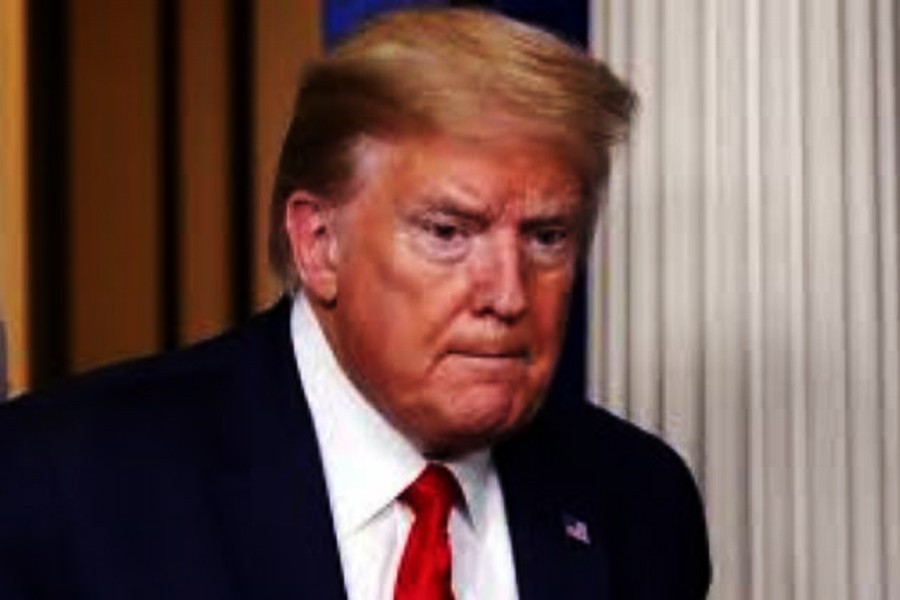US President Donald Trump has several strikes against him - age, obesity, elevated cholesterol and being male - that could put him at greater risk of becoming seriously ill from the coronavirus infection he disclosed early Friday.
Trump's doctor said later in the day that the president felt fatigued and that he had been given an experimental treatment aimed at staving off a severe case of COVID-19. Friday evening he was flown to a military hospital where he will spend a "few days." Being there would allow for closer monitoring, such as if doctors decide they'd like scans of his lungs, and a quicker reaction time if he takes a turn for the worse.
"The odds are far and away that he'll have a mild illness" as most people with the virus do, said Dr. Gregory Poland, an infectious disease specialist at the Mayo Clinic who has no role in Trump's care.
But COVID-19 is very unpredictable, he stressed.
"We have young people who die. We have nursing home patients, a lot of them, who actually do quite well," Poland said.
Here's what experts say about Trump's outlook and next steps.
SIGNS AND SYMPTOMS
Infection causes mild or no symptoms in about 80 per cent of cases. About 15 per cent of people become seriously ill and 5.0 per cent get critically ill.
Symptoms, when they do occur, usually appear two to 14 days after infection and can include loss of smell or taste, coughing, a sore throat, trouble breathing, fatigue, muscle or body aches, headache, nausea or vomiting, diarrhoea and fever.
Up to half of patients who are hospitalised don't have a fever when admitted but nearly all develop one. How people fare varies widely - some seem to be recovering and then suddenly worsen.
Pneumonia, often with a specific appearance on X-rays, sometimes develops but complications in virtually every organ of the body have been reported.
Doctors also increasingly recognise that some people have long-lasting symptoms.
TRUMP'S RISKS
Older age, being male and having any other health problems increase the chance of severe illness, and Trump has those.
At 74, "his age would be the primary risk factor," said Dr. David Banach, an infectious diseases physician at the University of Connecticut's health system.
People ages 65 to 74 are seven times more likely to be hospitalised for COVID-19 than those who are 18 to 29 years old, according to the US Centers for Disease Control and Prevention. The risks rise exponentially at older ages.
Trump also is obese, with a body mass index just past 30.
"Obesity is a state of chronic lowered immunity. In other words, you don't respond to vaccines as well, you don't respond to infections as well" as people of normal weight, Poland said.
Trump takes a statin drug to lower his cholesterol, and that condition also raises his risk for COVID-19 complications, doctors said.
NEXT STEPS
Doctors likely will check Trump often for any difficulty in breathing, coughing or other symptoms, Banach said.
No drugs are known to help for people with no or very mild symptoms. Remdesivir and steroids have shown benefit for certain moderately and severely ill patients and remdesivir is now being tested for patients in the early stages of COVID-19.
Late Friday, Trump's physician, Dr. Sean Conley, said the president had been given remdesivir at the military hospital.
Earlier, Trump was given an experimental antibody drug that's currently in late-stage studies from Regeneron Pharmaceuticals Inc.
Antibodies are proteins the body makes when an infection occurs. They attach to a virus and help it be eliminated. The Regeneron drug is made with purified versions of two such antibodies.
RISK TO OTHERS
Could Trump have infected Democratic presidential nominee Joe Biden during the debate Tuesday night?
Possible, but not likely, experts said. The candidates were more than six feet apart. But both candidates, especially Trump, spoke loudly, which research suggests can make virus particles travel farther, Poland said.
Biden said Friday on Twitter that he and his wife, Jill, tested negative.
Dr. George Abraham, who heads the infectious disease board for the American Board of Internal Medicine, warned that "a negative test doesn't guarantee that someone is not harbouring virus" because there might be too little to detect early in infection.
"This is a wakeup call" that shows the need for social distancing, wearing masks and other measures to reduce spread, Abraham said.
Biden similarly tweeted, "I hope this serves as a reminder: wear a mask, keep social distance, and wash your hands."
A myriad of other people who have been around Trump in the previous 48 hours are at risk, doctors said.
"Contact tracing is going to be really important," Banach said. "The president comes into contact with many individuals during the day."


